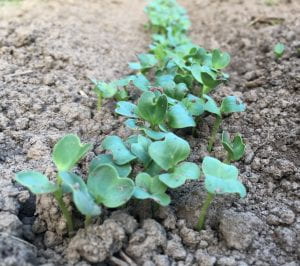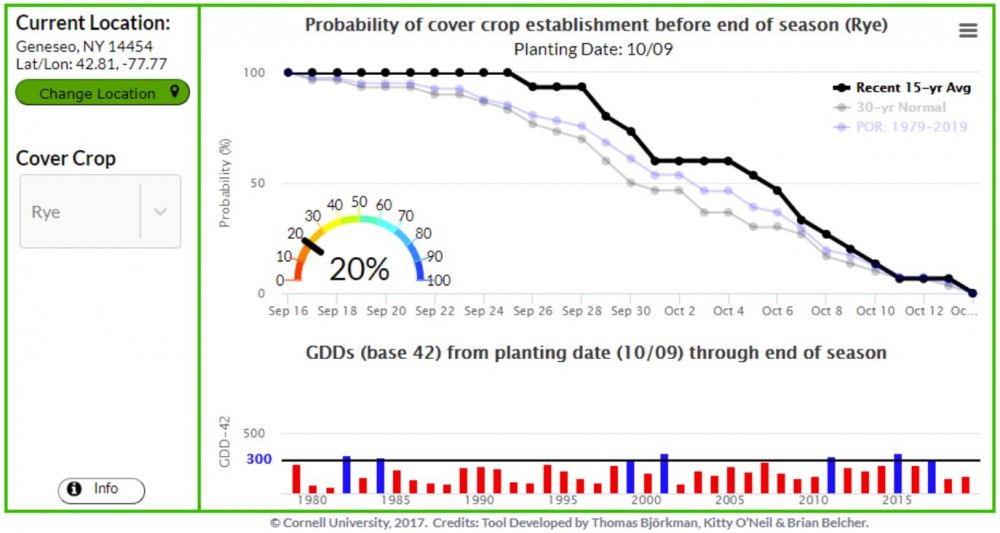Is it Too Late to Plant Cover Crops?
Amy Barkley, Team Leader & Livestock Specialist
Southwest New York Dairy, Livestock and Field Crops Program
Is it Too Late to Plant Cover Crops in WNY?
by Jodi Putman
 In the last week, many people have asked, "How late is too late to plant a cover crop this fall?" I would be more confident in recommending the last date for establishing a cover crop if I knew what the weather would be like for the next four-six weeks.
In the last week, many people have asked, "How late is too late to plant a cover crop this fall?" I would be more confident in recommending the last date for establishing a cover crop if I knew what the weather would be like for the next four-six weeks.
It comes down to understanding the weather trends for your area and the amount of risk you want to take, much like the same risk you take in deciding when to plant your cash-crop in the spring. If it's mid-June and still too wet to plant corn do you switch to beans? For cover crops, the same thinking applies.
Species PotentialIt's commonly known that cereal rye can be planted anytime in the fall and will undoubtedly grow. You may not see it until spring, but it'll be there. The question is, when do other species reach their limit on a justifiable planting window? It's important to know that within a given species there are winter hardiness and late planting date variations. An example, as it relates to the planting date is hairy vetch; varieties can vary widely in survivability. Only with personal experience or advice from a trusted farmer or seed salesperson, can you know how particular species perform in your field.
Cover Crop MixesPlanting cover crop mixes has been common for many reasons. Specifically, this method at the end of a planting window for species has merit. For instance, in most regions, radishes might be the best cover to plant at the end of September. But if you planted them in a mix that includes cereal rye or triticale, spending $4.50 an acre on 2 pounds of radish seed could be worth the risk. In addition, a mix with more winter-hardy species can protect the others.
Seed in the GroundBe sure to get the seed in the ground any time you're planting late. Do not broadcast the seed on the soil surface, as this will delay germination if rain is not experienced immediately. In the fall, soil temperatures are generally warm and seeds will sprout rapidly, especially in a no-till situation where there's significant crop residue.
Climate Smart Farming Winter Cover Crop Planting SchedulerThe winter cover crop planting scheduler, which is affiliated with Cornell's Climate Smart Farming Program, was created by Cornell University for those in the Northeast. Just type in your zip code, enter the desired species you would like to plant, on any given date, and the model will tell you the likelihood of success. It uses historical weather data from the last 30 years, but also allows for the past 15 years to see more recent weather trends. For those of you more comfortable managing late planning decisions with data, this tool is for you!
The Climate Smart Farming Winter Cover Crop Planting Scheduler can be found at this web address: http://climatesmartfarming.org/tools/csf-winter-cover-crop-planting-scheduler/
 The CSF Winter Cover Crop Planting Scheduler tool showing the probability of establishing a Rye cover crop in Geneseo, NY before the end of the season. Click the image to view larger.
The CSF Winter Cover Crop Planting Scheduler tool showing the probability of establishing a Rye cover crop in Geneseo, NY before the end of the season. Click the image to view larger.Upcoming Events
Boots in the Barn: Cornell Dairy Research Updates
January 13, 2026
January 20, 2026
January 27, 2026
February 3, 2026
February 10, 2026
February 17, 2026
February 24, 2026
Join us for some or all!
2026 No-Till & Cover Crop Conference
February 19, 2026 : 2026 No-Till & Cover Crop Conference
South Burlington, VT
Deerworm and Flukes in Small Ruminants Webinar
February 25, 2026 : Deerworm and Flukes in Small Ruminants Webinar
Dr. Mary Smith from Cornell's College of Veterinary Medicine and Dr. Rachel White from UMaine Cooperative Extension will be discussing the lifecycles, signs, prevention, and management of deerworm and liver flukes in small ruminants.
Announcements
Cows, Crops & Critters Newsletter Sponsorship
TRYING TO REACH GROWERS AND AGRIBUSINESSES IN OUR SOUTHWEST REGION OF NEW YORK?Weekly Email Update: Shared with 625+ households who have signed up with our program.
Monthly Paper Mailer: To reach our stakeholders and farmers who lack internet access, we send out a monthly mailer where your company's logo and contact information would be featured with a mailing list of 330+ households.
If you sponsor our weekly and monthly publications you reach approximately 955 households.





